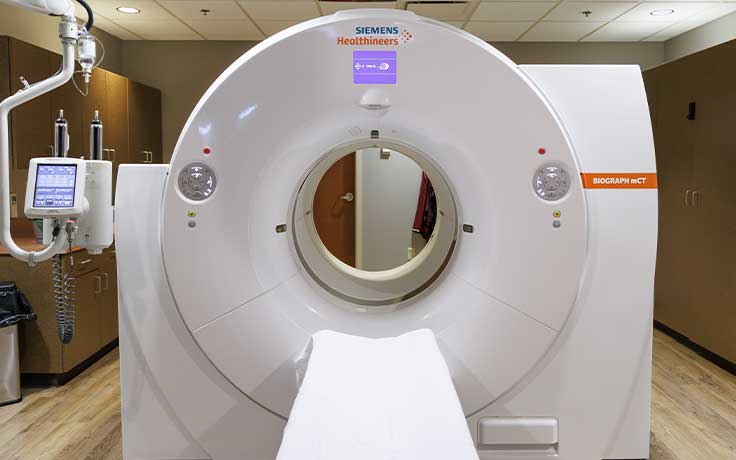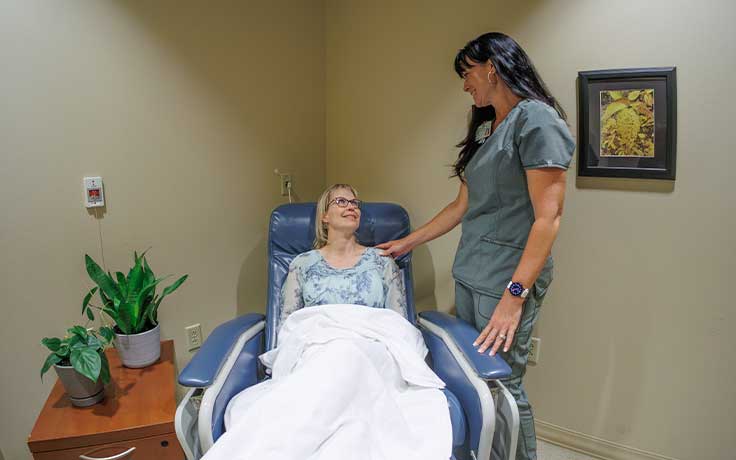PET/CT
Positron Emission Tomography (PET) is a nuclear medicine procedure that produces pictures of the body’s biological functions through clinical imaging. A PET scan is able to capture chemical and physiological changes related to metabolism, as opposed to gross anatomy and structure, which is obtained by CT and MRI. This is important since function changes are often present before structural changes in tissues. PET images may therefore demonstrate pathological changes long before they would be evident on CT or MRI.
The scanner at Dakota Radiology Imaging Center is configured to capture both the biological image of a PET scan and the structural image of the CT scan at the same time. Because the images are captured at the same time, your body – both externally and internally – is in the same position. Both images are viewed by the radiologists and fused together through the help from advanced software tools to pinpoint exactly where disorders are located in the body.

How PET/CT Used
Oncology patients may have a PET/CT exam as it is helpful in diagnosing, staging (determining the extent of), as well as monitoring treatment response in a number of types of cancers. PET/CT is also used to aide in the diagnosis of neurological disease and certain types of cardiovascular disease.
Types of PET Services We Offer
- Client to provide list
FDG is Safe
Fluorodeoxyglucose or FDG is a radioactive isotope attached to a form of glucose (sugar) and is the most common isotope used in PET. To begin the PET procedure, a small amount of the glucose is injected into your bloodstream. There is no danger to you from this injection. Glucose is a common substance that every cell in your body needs in order to function. Diabetic patients need not worry; it would take 1,000,000 doses of FDG to equal the glucose in one teaspoon of sugar.
FDG has a half-life of approximately 110 minutes and is excreted by way of the kidneys, so it is quickly dispelled from your body. FDG must pass multiple quality control measures before it is used for any patient injections.
How to Prepare for a PET/CT
- Do not eat or drink anything for 4 hours prior to your exam.
- Wear comfortable clothing and take any prescribed medications on the day of the exam unless instructed not to do so by your physician.
- Our nursing staff will contact you 1-5 days prior to your exam with specific instructions for your particular exam.
What to Expect During Your PET/CT Test
- A technologist will ask you a series of questions regarding you medical history.
- A small sample of blood will be taken to test your blood sugar level.
- Then, the technologist will inject a small amount of a radioactive tracer called FDG.
- Once injected, you will be asked to rest for about 60 minutes while the tracer distributes through your body and is processed by the organs being evaluated.
- Finally, the technologist will ask you to lie on the scanner bed and you will slowly pass through the scanner.

Frequently Asked Questions
How long does the exam take?
The exam may take anywhere from 1½ - 2 hours from start to finish.
Can I eat or drink before the exam?
We ask that you do not eat or drink anything for 4 hours before your exam.
Can I drive after the exam?
Yes, you may continue regular activities after the exam. If a prescription for claustrophobia is given, you may be required to have a ride after the exam.
Can I schedule my exam?
Imaging scans are not a self-referral exam. Your physician’s office will call us to schedule a time that is convenient for you. We will be required to have a signed order from your physician to proceed with the exam. A schedule coordinator will contact you prior to your exam to gather necessary information. This helps enable us to get you registered and back for your exam as quickly as possible.
How will I receive my results?
The specialty trained radiologists at Dakota Radiology Imaging Center will review the newly acquired images and any previous related exams. They will dictate a detailed report explaining their findings. The report is sent to your physician. Your physician will review the findings with you.
Will my insurance cover my procedure?
Many private insurance companies and Medicare provide coverage for some imaging procedures depending on medical necessity. The staff at Dakota Radiology Imaging Center will be happy to work with you to verify your benefits, eligibility and authorizations. We will submit claims as needed for your imaging scans. If the procedure cannot be covered by your insurance provider, we will be happy to develop a payment plan with you.

 MRI
MRI CT
CT PET
PET Ultrasound
Ultrasound Women's Imaging
Women's Imaging X-Ray
X-Ray Bone Densitometry (DEXA)
Bone Densitometry (DEXA)